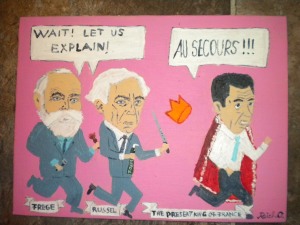
Someone at Yahoo!Answers asks, "What is Russell's Theory of Descriptions about?"
Hey, I do what I can to help those in need.
Russell was concerned with the truth or falsity of a statement of this sort, "The King of France is bald." The statement appears at first to violate the law of the excluded middle (LEM) -- roughly, the notion that any sufficiently unambiguous and clear proposition is either true or false. Russell wanted to keep LEM for his own metaphysical and epistemological reasons, so he needed a theory that could show that the proposition, "the King of France is bald" is either true, or false, or ambiguous.
Notice that the statement is in the present tense. France is nowadays a republic, and was a republic when Russell wrote. There is no King, thus he is neither bald nor does his head have hair.
Russell's solution, the theory of descriptions, says in effect that what the statement in question really means is this: the world I live in is a place that includes a King of France who is bald.
And THAT sentence is false. Thus, LEM is saved.
In short form, the Russellian theory of descriptions says that definite descriptions are "existentially quantified statements."
http://www.mth.msu.edu/~mccarthy/student.information/existential.html
Russell was also arguing with Frege in the course of developing his own theory of such matters, which explains why Russell and Frege are both running after the nonexistent King in the cartoon above.
And that one has a full head of hair, which also saves LEM.
Comments
Post a Comment